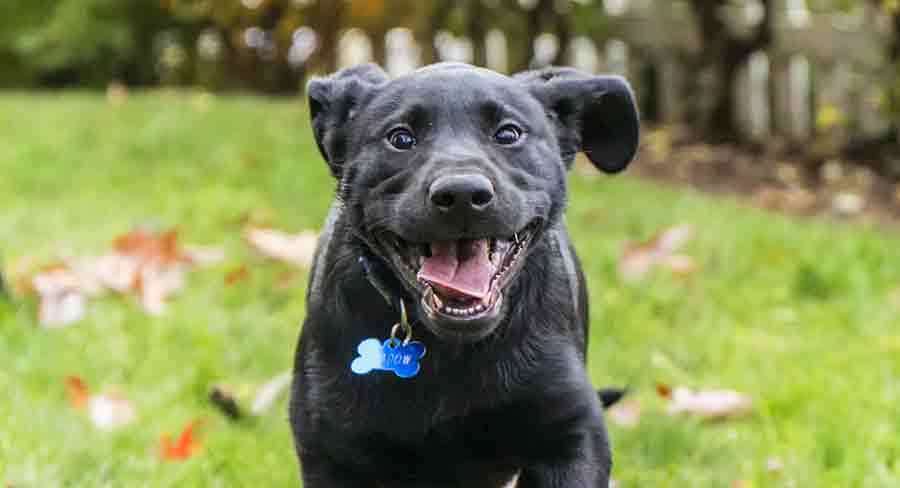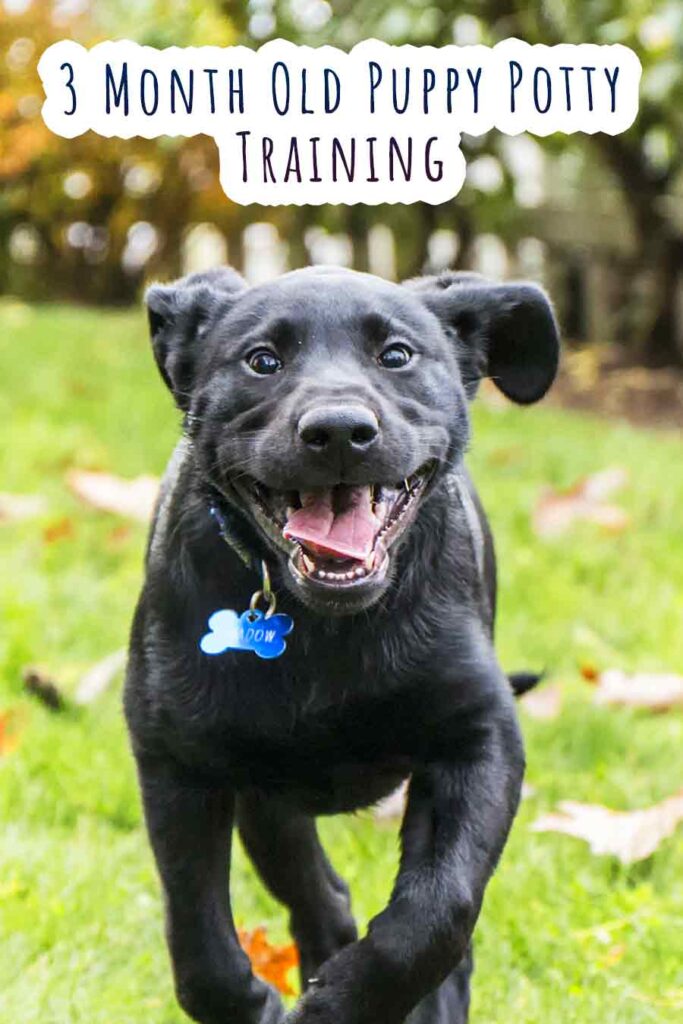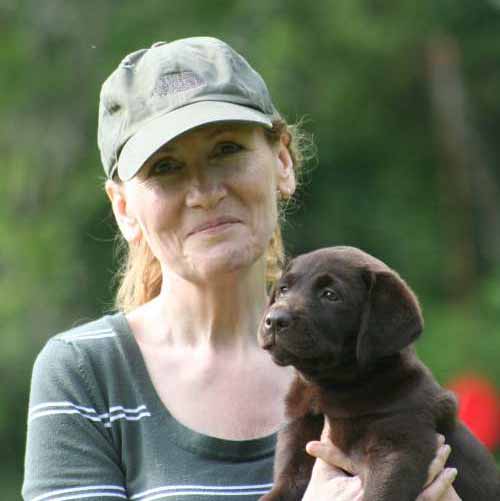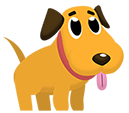
In this detailed guide to 3 month old puppy potty training, we take a look at the toileting milestones you can expect to be hitting, and how to stay on track towards perfect housetraining.
There are broadly three types of potty training at three months old:
- Starting from scratch with a puppy who has just come home.
- Continuing successful potty training with a puppy who came home earlier.
- And hitting ‘reset’ on potty training that hasn’t been going well, or has regressed.
We’ll take a look at all three, and what steps to take next in each scenario.
How To Potty Train a 3 Month Old Puppy From Scratch
Let’s start with how to potty train a 3 month old puppy who has just come home. Perhaps you had an arrangement with the breeder to collect them at 12 weeks old, or perhaps you’ve rescued them from a shelter.
If they’ve been living with a breeder or fosterer until now, it’s likely that they’ve started some potty training already. However, your home is a completely new environment, and puppies aren’t very good at applying a rule they’ve learned in one place to somewhere new. So it’s smart to think of potty training in this situation in exactly the same way as potty training a younger puppy.
Your puppy still has very little control over when they pee and poop. From a developmental perspective, their brain is only receiving the signals to tell them that their bladder or bowel is full at nearly the last minute. And physically, they don’t have much muscle strength or coordination to hold on very long once they’re full. So realising they need the toilet is followed almost straight away by going to the toilet, and they can’t really control that.
3 Month Old Puppy Potty Training Schedule
Setting up successful toilet training with a puppy who’s just come home is all about building up a standard of peeing in the right place, and avoiding accidents. So, take them out to their toilet spot:
- when they wake up in the morning
- after eating
- after playing
- when they wake up from naps
- and every 30 minutes in between those events.
Remember, the more often your puppy gets it right, the sooner they will understand that outside is the only place to pee. So make it your mission not to give them any chances to get it wrong!

House Training A 3 Month Old Puppy
Next let’s take a look at the puppy who came home at 8 weeks old. You have been a potty training ninja since then, and consequently your puppy has had lots of successes, and only very few indoor accidents. Hurray! Now you might be starting to wonder how long you have to keep it up. When does the constant vigilance end, and when will your puppy start telling you when they need to go out?
Well, this depends partly on the type of puppy. Most puppies’ capacity and control gradually grows with them, affording bigger gaps between toilet breaks, until you can officially declare them housebroken at around 6 to 7 months old. But there are exceptions. For example toy dogs like Yorkshire Terriers have very tiny bladders, which get full to bursting much quicker. Even the most successfully trained puppy can also have accidents up to (and even slightly beyond) their first birthday. For example, they might do an excited wee in the wrong place when they meet someone new.
So, don’t take your progress for granted just yet.
How long can a 3 month old puppy go without peeing during the night?
At the 12 week mark, it’s also likely that you’re starting to feel pretty tired! Broken sleep is grueling, and makes everything else about having a puppy feel more challenging too. Puppies can generally hold their bladders for longer at night than during the day. But how much longer varies from pup to pup.
Some people use the following formula as a rule of thumb: the maximum number of hours a puppy can hold their bladder for is equal to their age in months, plus one. So a 3 month old puppy can go for about four hours without peeing. In reality all puppies need more opportunities than this to pee outside during the day. And some 3 month old puppies can already hold on longer than this at night.
If you have to wake your puppy to go for a toilet break after 4 hours of night time sleep, then you can move your alarm to 4 hours and 15 minutes the following night. If they’re still asleep then, keep adding 15 minute blocks of time to your alarm, until your puppy is awake and waiting for you when you arrive. At this point don’t add any more time to your alarm for several nights, to give their bladder a chance to mature further. Then repeat the process.
What to do when your 3 month old puppy has an accident
It’s frustrating to still be dealing with occasional accidents when your puppy is three months old. You’ve probably noticed the puddles are getting bigger too! When it happens:
- Don’t punish them. This includes shouting at them, or pushing their nose into the accident. This doesn’t teach them anything about what they did wrong and what they should have done instead. But it does teach them to hide out of sight when they use the toilet indoors, and to be afraid of you.
- Take them outside. If you catch them in the act, whisk them outside the to correct toilet spot quickly and calmly, without making a fuss.
- Clean up thoroughly. Dogs love to pee where they have peed before, and they have fantastically sensitive noses for detecting traces of previous accidents. Enzyme sprays destroy the proteins in dogs’ pee so they can’t recognize the smell anymore. Follow the instructions on the bottle for maximum effect.
3 Month Old Puppy Not Potty Trained
Finally, let’s take a look at puppies who are still having frequent accidents at 3 months old. Or who have started having accidents after a period of potty training success.
Dogs don’t really have any inherent understanding of outdoors being the right place to pee, and indoors being wrong. But, when we succeed in making sure that they have a long, unbroken history of only peeing outdoors, it starts to feel like the only natural way to do it. 3 month old puppies who are still regularly having accidents inside the house haven’t yet formed a clear association between using the toilet and being outdoors. This usually happens either because we haven’t been diligent enough about taking them outside very frequently. Or, because they’ve been getting distracted and forgetting to use the toilet until they come back inside.
3 month old puppy potty training regression
Potty training regression at any age is usually because the human in charge has gotten a little complacent. But sometimes it’s because they have an underlying health problem which is causing them to need to pee more often. For example a urinary tract infection. If the number of times your puppy is peeing in a day increases suddenly, ask your vet to check them over.
Resetting a 3 month old puppy’s potty training
If your puppy is having regular accidents, and it’s not for a medical reason, then it’s time for a hard reset on their toileting habits. The more accidents they have, the more they will learn to associate indoors with being a place to pee. So it’s important to act fast, act decisively, and break the cycle!
Resetting your puppy’s toilet habits is probably going to involve cancelling some other plans in the short term. But the good news is that you have the ultimate power to control where your puppy pees, and you can use this to establish good habits. So it’s worth a few days’ pain, for a lifetime of gain.
This article includes a technique for resetting the toilet habits of a puppy who seems to be regressing. Make time for it, and you’ll be back on track very quickly.
3 Month Old Puppy Potty Training – Summary
At 3 months old, your puppy’s potty training is far from complete. Their ability to sense when their bladder or bowel is getting full is still underdeveloped, and they don’t have much physical strength hold on once they realise they need to go. But, if you manage their toilet breaks carefully, you should be able to avoid a lot of accidents. You’ll also set up a strong precedent for always toileting outside, which means your puppy won’t be able to imagine doing anything else once they do develop full control.
How is your puppy getting along?
Are you feeling quietly confident, or still struggling with accidents? Let us know what’s worked for you, and swap tips with other puppy parents, in the comments box down below.
You Might Also Like Reading
- How Long Does It Take To Train A Puppy?
- Puppy Training For Kids
- How Do You Potty Train A 4 Month Old Puppy
- How Much To Feed A Weimaraner Puppy
- How Much To Feed A Beagle Puppy

Free Training Tips
Get Pippa's free dog training tips delivered to your inbox

 What is a Gentle Leader Collar for Dogs?
What is a Gentle Leader Collar for Dogs?
My puppy is almost 3 months old. I take her out to pee as soon as she wakes in the morning, after feeding her,after training sessions,after a nap after play and any exercise and any time in between and she will still have accidents in her play pen, sometimes she pees even right after she peed outside.
I’m beginning to get frustrated because I’ve never had a puppy that has taken this long to train.